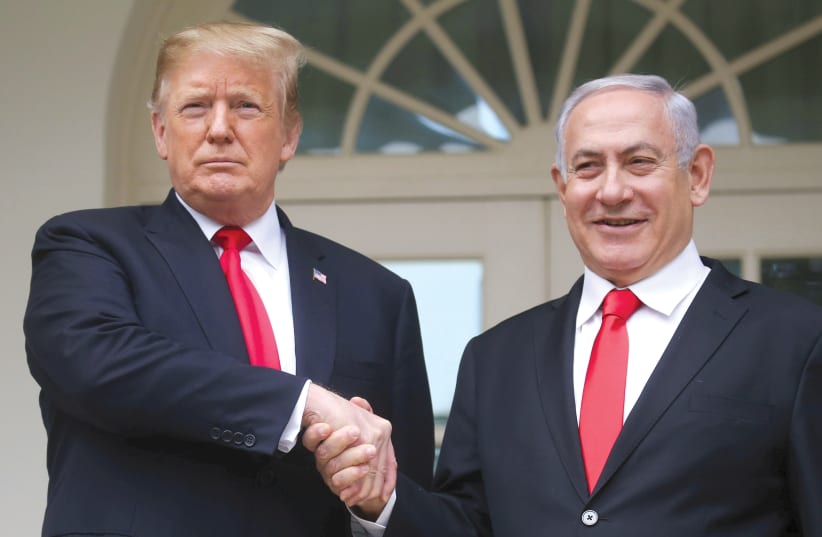The interview was conducted as part of the International Tel Aviv Salon series ahead of the March 23 election. See full transcript of the interview here >>
Even in the US presidential race, in which he seemed to have bet on the wrong horse, Netanyahu defended his close embrace of Donald Trump and said he does not regret it.
“I think what he did, recognizing the Golan under Israeli sovereignty, recognizing Jerusalem as Israel’s capital, moving the embassy here, getting out of this dangerous Iran deal, and I think these are great things,” he said. “And of course, I embraced it, because that’s my policy.”
Netanyahu brushed off any possible tensions with US President Joe Biden, touting their decades-long relationship, as well as his renown in the US.
“When I deal with the US, our indispensable ally under changing administrations, I always remember one thing: I represent the State of Israel,” he said. “I don’t represent Republican interests; I don’t represent Democratic interests; I represent Israeli interests. And when I need to take a stand for something that I think is important for Israel’s survival and security, I don’t hesitate to do it under any administration.”
Netanyahu said stopping Iran’s nuclear program was one of his top priorities in a future term in office and defended his decision to stand up to the Obama administration against the 2015 nuclear deal.
“Because of what I did, Iran has been set back for years, and because of what I will do, they will never, ever have a nuclear weapon,” he said. “As long as I’m prime minister, Iran will not have atomic bombs.”
That strong stance against Iran was what helped bring Bahrain, the United Arab Emirates, Morocco and Sudan to normalize relations with Israel, Netanyahu said.
“That’s really what did the pivot,” he said. “That’s what made them come to Israel. They saw Israel not merely as a source of technology for everything, clean energy, hi-tech, water and so on. They saw Israel as standing up against Iran, which threatens them. It threatens us more, with destruction, but they understood that, so Israel became an indispensable ally.”
Regarding the recent decision by the High Court of Justice to recognize conversions performed in Israel by the Reform and Conservative movements for the purpose of receiving citizenship under the Law of Return, Netanyahu said he was concerned about “fake conversions that could enter the country.”
“Any Reform, Conservative person, Israel is their home; that’s not an issue,” he said. “People can do this and they can come here, and that’s fine. The real issue is we have to protect and prevent fake conversions that could enter the country. You know a lot of people want to come into the country.”
“In fact, I put up a fence, you know,” he added. “They call it a wall. But I prevented the overrunning of Israel, which is the only first-world country that you can walk to from Africa. We would have had here already a million illegal migrants from Africa, and the Jewish state would have collapsed. The Jewish State, Conservative, Reform, Orthodox, would have collapsed.”
Asked about his sudden turn during this election campaign to try and attract Israeli-Arab votes, Netanyahu said his interest in Israel’s Arab community was not new. In 2015, he famously warned on Election Day that Arabs were coming out in large numbers to vote against him.
“I’m changing things because it’s a battle between modernity and medievalism,” he said. “The Islamists want to take us back; the modernists like me want to take us forward. I want them to be involved, and you know what, they’re coming to Likud because they understand that what I said is true.
“This is my vision. I’d like to see what I see in Dubai and Abu Dhabi in the Arab communities here. You think that’s impossible? I think it’s possible. It’s happening in the Jewish parts. Why can’t it happen in the Arab parts?”
Netanyahu said his legacy would be “the protector of Israel and the liberator of its economy.”
“The protector of Israel, because I devoted much of my adult life to preventing Iran from having a nuclear weapon… I have devoted my life, so far successfully, to preventing them from being able to do that, and as long as I am prime minister, they will never be able to do that,” he said. “And the second thing, the liberator of its economy, because I have introduced a free-market economy. All the others are just yakking away. They tweet, they talk, and they haven’t a clue how to do it. But I’ve done it.”
And finally, Netanyahu revealed what he watches on TV to unwind. Perhaps unsurprisingly, considering the headlines about the British Royal family this week, it is The Crown.
Separately, Netanyahu said he would be willing to consider a debate with Yesh Atid leader Yair Lapid.
Netanyahu tweeted he would do so once Lapid “stops hiding behind [Yamina leader Naftali] Bennett and [New Hope leader] Gideon [Sa’ar] and say the truth: He is running for prime minister. When we are coming out of coronavirus and must rehabilitate the economy, we must decide who will be the next prime minister, Lapid or me. Lapid, who was the worst finance minister, or me, who saved Israel from two economic crises.”

